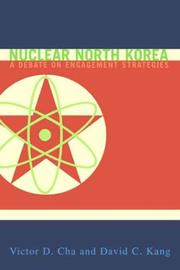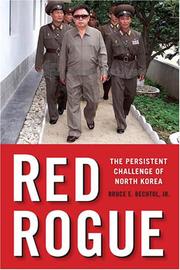| Listing 1 - 7 of 7 |
Sort by
|
Book
ISBN: 9780367198145 9780429260797 0429260792 9780429551086 0429551088 9780429536380 0429536380 9780429522918 0429522916 9781315769462 1315769468 0367198142 9780415750394 0415750393 Year: 2020 Publisher: London Routledge
Abstract | Keywords | Export | Availability | Bookmark
 Loading...
Loading...Choose an application
- Reference Manager
- EndNote
- RefWorks (Direct export to RefWorks)
"This book analyses North Korea's foreign policy towards the United States during the Kim Jong Il era. Throughout these years, North Korea sought but failed to normalise diplomatic relations with the United States. Making use of theories of bargaining and learning in International Relations, the book explains how the inability of the Kim Jong Il government to correctly understand domestic politics in Washington and developments in East Asian international relations contributed to this failure. As a result, Pyongyang accelerated development of nuclear weapons programme with the aim of strengthening its negotiating position with the US. However, towards the end of the Kim Jong Il government it became unclear whether North Korea is willing to reverse its nuclear programme in exchange for normal diplomatic relations with the United States. The book includes material from over 60 interviews with American, Chinese, Japanese, Korean and Russian policy-makers and experts who have dealt with North Korea. It also analyses in detail Pyongyang's official media articles published during the Kim Jong Il era.This work will be of great interest to students and scholars of US Foreign Policy, Korean Politics and International Relations alike"--
USA--FOREIGN RELATIONS--KOREA (NORTH) --- KOREA (NORTH)--FOREIGN RELATIONS--USA --- KOREA (NORTH)--FOREIGN RELATIONS --- Kim, Chŏng-il, - 1942-2011 --- United States - Foreign relations - Korea (North) --- Korea (North) - Foreign relations - United States --- Korea (North) - Foreign relations --- United States --- Korea (North)
Book
ISBN: 9782343033495 2343033498 Year: 2014 Publisher: Paris : L'Harmattan,
Abstract | Keywords | Export | Availability | Bookmark
 Loading...
Loading...Choose an application
- Reference Manager
- EndNote
- RefWorks (Direct export to RefWorks)
Les relations entre la Corée du Nord et les Etats-Unis sont examinés à l'aune des événements qui se sont déroulés entre 1993 et 2013. ©Electre 2015
Corée (République populaire démocratique) --- Etats-Unis --- Relations extérieures --- Geopolitics --- Nuclear weapons --- United States --- Korea (North) --- Foreign relations --- Corée (République populaire démocratique) --- Relations extérieures --- Geopolitics - Korea (North) --- Nuclear weapons - Korea (North) --- United States - Foreign relations - Korea (North) --- Korea (North) - Foreign relations - United States --- United States - Foreign relations - 1989 --- -Corée (République populaire démocratique)
Book
ISBN: 9781626164529 9781626164536 9781626164543 1626164541 1626164533 1626164525 Year: 2017 Publisher: Washington, District of Columbia : Georgetown University Press,
Abstract | Keywords | Export | Availability | Bookmark
 Loading...
Loading...Choose an application
- Reference Manager
- EndNote
- RefWorks (Direct export to RefWorks)
North Korea is perilously close to developing strategic nuclear weapons capable of hitting the United States and its allies in East Asia. Since their first nuclear test in 2006, North Korea has struggled to perfect delivery systems, but Kim Jong-un's regime now appears to be close. Sung Chull Kim, Michael Cohen, and the contributors to this volume contend that the time to prevent North Korea from getting this capability is virtually over, and instead scholars and policymakers must turn their attention to how to deter North Korea. The United States, South Korea, and Japan must also come to terms with the fact their North Korea will be able to deter them with its nuclear arsenal. How will the erratic Kim Jong-un behave when North Korea does develop the capability to hit medium- and long-range targets with nuclear weapons; how will the United States, South Korea, and China respond; and what will this mean for regional stability in the short term and long term? The international group of authors in this volume address these questions and offer a timely analysis of the consequences of an operational North Korean nuclear capability for international security.
NUCLEAR WEAPONS--GOVERNMENT POLICY--KOREA (NORTH) --- NUCLEAR NONPROLIFERATION--KOREA (NORTH) --- USA--FOREIGN RELATIONS--KOREA (NORTH) --- KOREA (NORTH)--FOREIGN RELATIONS--USA --- Nuclear weapons --- Nuclear arms control --- United States --- Korea (North) --- Foreign relations --- Korea [North ] --- Nuclear weapons - Korea (North) --- Nuclear arms control - Korea (North) --- United States - Foreign relations - Korea (North) --- Korea (North) - Foreign relations - United States.

ISBN: 1282871919 9786612871917 0231505337 9780231505338 9780231131285 0231131283 9781282871915 6612871911 Year: 2003 Publisher: New York Columbia University Press
Abstract | Keywords | Export | Availability | Bookmark
 Loading...
Loading...Choose an application
- Reference Manager
- EndNote
- RefWorks (Direct export to RefWorks)
Coming to the issues from different perspectives, the authors together have written an essential work of clear-eyed reflection and authoritative analysis. They refute a number of misconceptions and challenge faulty thinking that surrounds the discussion of North Korea, most important, the idea that North Korea is an irrational nation. Cha and Kang contend that however provocative, even deplorable, the North's behavior may at times be, it is not incomprehensible or incoherent.
Korea (North) -- Foreign relations -- United States. --- Korea (North) -- Military policy. --- Nuclear warfare -- Korea (North). --- United States -- Foreign relations -- Korea (North). --- World politics -- 21st century. --- Military & Naval Science --- Law, Politics & Government --- Armies --- Nuclear warfare --- World politics --- Korea (North) --- United States --- Military policy. --- Foreign relations --- Atomic warfare --- CBR warfare --- Nuclear strategy --- Nuclear war --- Thermonuclear warfare --- War --- Nuclear crisis control --- Nuclear weapons --- K9564.11 --- K9570.90 --- K9578.15 --- Korea: International politics, law and relations of North Korea -- North America -- United States --- Korea: Defense and military -- general and history -- North Korea (1945- ) --- Korea: Defense and military -- weaponry -- North Korea
Book
ISBN: 9781108473484 1108473482 9781108562225 9781108461719 1108699731 1108562221 1108584616 Year: 2019 Publisher: Cambridge Cambridge University Press
Abstract | Keywords | Export | Availability | Bookmark
 Loading...
Loading...Choose an application
- Reference Manager
- EndNote
- RefWorks (Direct export to RefWorks)
In 2017, the world watched as President Donald Trump and North Korean leader Kim Jong Un traded personal insults and escalating threats of nuclear war amid unprecedented shows of military force. Former Pentagon insider and Korean security expert Van Jackson traces the origins of the first American nuclear crisis in the post-Cold War era, and explains the fragile, highly unpredictable way that it ended. Grounded in security studies and informed analysis of the US response to North Korea's increasing nuclear threat, Trump's aggressive rhetoric is analysed in the context of prior US policy failures, the geopolitics of East Asia, North Korean strategic culture and the acceleration of its nuclear programme. Jackson argues that the Trump administration's policy of 'maximum pressure' brought the world much closer to inadvertent nuclear war than many realise - and charts a course for the prevention of future conflicts.
Nuclear weapons --- Testing --- Trump, Donald, --- Kim, Chŏng-ŭn, --- United States --- Korea (North) --- Foreign relations --- Military policy --- Nuclear warfare --- Atomic warfare --- CBR warfare --- Nuclear strategy --- Nuclear war --- Thermonuclear warfare --- War --- Nuclear crisis control --- Kim, Chŏng-ŭn, --- 김 정은, --- Kim, Jong-un, --- Kim, Jong-eun, --- Kimu, Jon'un, --- 金 正恩, --- 金正恩, --- Trump, Donald J., --- Tramp, Donalʹd, --- Трамп, Дональд, --- 川普唐納德, --- The Donald, --- Donald, --- Trump, Donald John, --- Nuclear weapons - Korea (North) --- Nuclear weapons - Korea (North) - Testing --- Trump, Donald, - 1946 --- -Kim, Chŏng-ŭn, - 1984 --- -United States - Foreign relations - Korea (North) --- Korea (North) - Foreign relations - United States --- Korea (North) - Military policy --- -United States
Book
ISBN: 0833081756 0833081721 9780833081759 9780833081735 083308173X 9780833081742 0833081748 9780833081728 Year: 2013 Publisher: Santa Monica, CA : RAND Corporation,
Abstract | Keywords | Export | Availability | Bookmark
 Loading...
Loading...Choose an application
- Reference Manager
- EndNote
- RefWorks (Direct export to RefWorks)
A North Korean government collapse would have serious consequences, including a humanitarian disaster and civil war. The Republic of Korea and the United States can help mitigate the consequences, seeking unification by being prepared to deliver humanitarian aid in the North, stop conflict, demilitarize the North Korean military over time, secure and eliminate North Korean weapons of mass destruction, and manage Chinese intervention.
Failed states -- Korea (North). --- Korea (North) -- Economic conditions -- 21st century. --- Korea (North) -- Foreign relations -- United States. --- Korea (North) -- Politics and government -- 2011. --- Korean reunification question (1945- ). --- United States -- Foreign relations -- Korea (North). --- Failed states --- Korean reunification question (1945- ) --- Korea (North) --- United States --- Economic conditions --- Foreign relations --- Politics and government --- Korean unification question (1945- ) --- Reunification of Korea (1945- ) --- Unification of Korea (1945- ) --- State failure --- Korean People's Republic --- People's Democratic Republic of Korea --- Koreĭskai︠a︡ Narodno-Demokraticheskai︠a︡ Respublika --- Korea (North Korean Government) --- Democratic People's Republic of Korea --- North Korea --- KNDR --- Chʻao-hsien min chu chu i jen min kung ho kuo --- Koreai Népi Demokratikus Köztársaság --- Korea (Democratic People's Republic) --- K.N.D.R. --- K.R.L.D. --- Korea (People's Democratic Republic) --- Korean People's Democratic Republic --- Chōsen Minshu Shugi Jinmin Kyōwakoku --- Chosŏn Minjujuŭi Inmin Konghwaguk --- KRLD --- Koreańska Republika Ludowo-Demokratyczna --- Kūriyā al-Dīmuqrāṭīyah --- D.P.R.K. --- DPRK --- Corée du Nord --- República Popular Democrática de Corea --- Corea (North) --- North Korean Interim Government --- Chosun Minchu-chui Inmin Konghwa-guk --- Political science --- Chaoxian minzhu zhuyi renmin gongheguo --- 朝鲜民主主义人民共和国

ISBN: 1612343635 9781612343631 9781597971119 1597971111 Year: 2007 Publisher: Washington, D.C Potomac Books
Abstract | Keywords | Export | Availability | Bookmark
 Loading...
Loading...Choose an application
- Reference Manager
- EndNote
- RefWorks (Direct export to RefWorks)
A unique analysis of the evolving North Korean threat and the challenges facing the South Korea-U.S. alliance
Nuclear arms control --- Nuclear weapons control --- Arms control --- Nuclear weapons --- Korea (North) --- Korea (South) --- United States --- Korean People's Republic --- People's Democratic Republic of Korea --- Koreĭskai︠a︡ Narodno-Demokraticheskai︠a︡ Respublika --- Korea (North Korean Government) --- Democratic People's Republic of Korea --- North Korea --- KNDR --- Chʻao-hsien min chu chu i jen min kung ho kuo --- Koreai Népi Demokratikus Köztársaság --- Korea (Democratic People's Republic) --- K.N.D.R. --- K.R.L.D. --- Korea (People's Democratic Republic) --- Korean People's Democratic Republic --- Chōsen Minshu Shugi Jinmin Kyōwakoku --- Chosŏn Minjujuŭi Inmin Konghwaguk --- KRLD --- Koreańska Republika Ludowo-Demokratyczna --- Kūriyā al-Dīmuqrāṭīyah --- D.P.R.K. --- DPRK --- Corée du Nord --- República Popular Democrática de Corea --- Corea (North) --- North Korean Interim Government --- Chosun Minchu-chui Inmin Konghwa-guk --- Chaoxian minzhu zhuyi renmin gongheguo --- 朝鲜民主主义人民共和国 --- Foreign relations. --- Economic policy. --- Military policy. --- Foreign relations --- Economic policy --- Military policy --- Nuclear arms control - Korea (North) --- Korea (North) - Foreign relations --- Korea (North) - Economic policy --- Korea (North) - Military policy --- Korea (North) - Foreign relations - Korea (South) --- Korea (South) - Foreign relations - Korea (North) --- Korea (North) - Foreign relations - United States --- United States - Foreign relations - Korea (North)
| Listing 1 - 7 of 7 |
Sort by
|

 Search
Search Feedback
Feedback About UniCat
About UniCat  Help
Help News
News